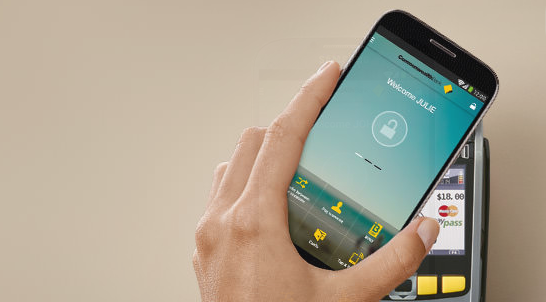
21 Mar Smartphones Tipped To Replace Credit Cards
We pay bills with our phones. We bank transfer money with our phones. We shop online with our phones.
And now you can now pay at a check out with your phone.
Not only have phones replaced visits to the bank and post office to send money and pay bills, our phones are now acting as our cash.
We are seeing this trend just starting to catch on in Australia with the release of PayPal’s new app for both Android and iOS in September last year.

Source: iTunes Store
When users open their PayPal app, they are presented with a list of merchants in the area. Users can then place orders or pay for items on the app instead of at the check out, either in-store or while on the go.
In addition to this, PayPal have teamed up with Samsung to allow to login and shop at any merchant that accepts PayPal on mobile and in-stores with only their fingerprint on Samsung’s latest Galaxy S5 device.
The Commonwealth Bank has taken this idea of contactless mobile payments a step further with the introduction of its Tap and Pay app in December.
It allows users to tap their phone against any eftpos machine with PayPass functionality and have the payment deducted from their account. Now, Westpac and ANZ are reportedly gearing up to create and launch their own versions of this mobile contactless payment app.
With technology like this on the horizon, it poses the question – will our phones replace credit cards and cash altogether?
A survey conducted by Pew Research showed that by the year 2020 mobile payments will be the most popular way to pay in America, with many other developed countries expected to follow suit.
Other experts estimate that the transition to mobile payment will happen even sooner than this.
Spokesperson for online money transfers service, PayPal UK, Rob Skinner told the Telegraph UK that people will primarily use their phones to shop by 2016.
“Mobile is the future of money,” he said. “If the first era was cash and cheque, and the second was debit and credit card, the third is mobile.”
He believes this transition will begin when consumers change their habits, but first there needs to be a clear benefit in paying by mobile.
“It’s our job to make mobile payments better than getting a card out in–store,” he said.
An article on the Sydney Morning Herald last week concluded that mobile payments do have the potential to make payments by plastic obsolete – that a world beyond cash and credit cards is in our future.
As this type of technology is developed and our devices become steadily more convergent, are we looking into a future where all we have in our pockets is our phone?

